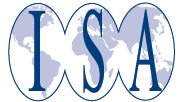1996-1997 Annual Report
Environmental Studies Section
1996-1997 Annual Report
Submitted by Philippe Le Prestre
The Environmental Studies Section has several purposes:
– to link scholars of various disciplines and keep them abreast of current developments in this field;
– to develop and encourage research;
– to disseminate information on environmental developments by sponsoring or participating in prof meetings;
– to seek ways to further the teaching of international environmental studies.
During 1996-97, the members of the various section committees were:
1996-97 Executive Committee:
Philippe Le Prestre (Université du Québec à Montréal), ex officio
Marian Miller (University of Akron)
Ron Mitchell (University of Oregon)
Paul Wapner (American University)
Detlef Sprinz (Potsdam Institute for Climate Impact Research)
Andrew Hurrell (Oxford University)
Miriam Lowi (Trenton State University)
1996-97 Sprout Award Committee:
Barbara Jancar-Webster (SUNY-Brockport), chair;
Hugh Dyer (University of Leeds)
Tom Princen (University of Michigan)
Valerie Assetto (Colorado State University)
Gary Bryner (Bringham Young University)
1996-97 Junior Scholar Travel Award Committee:
Philippe Le Prestre (Université du Québec à Montréal) chair
Ron Mitchell (University of Oregon)
Paul Wapner (American University)
1996-97 Nominating Committee:
Ken Conca (University of Maryland)
Mary Durfee (Michigan Technological University)
Neil Harrison (University of Wyoming)
Human Dimensions of Global Environmental Change
Marvin Soroos (North Carolina State University), Chair
Newsletter Editor: Marvin Soroos (North Carolina State)
ESS Webmaster: Ron Mitchell (U. of Oregon)
This past year (1995-96) has seen the following developments:
1. The 1997 ESS Conference Program at the Toronto Annual Meeting
The section sponsored or co-sponsored 23 panels, same as the year before. With 5.5% of all Conference panels, the section ranked fifth out of 18 sections.
At least two theme panels had an environmental focus, and several panels sponsored by other sections (e.g. peace studies) also pertained directly to environmental issues. Many other proposals could not be accomodated. This testifies to the high level of interest in these issues as well as to their connections with the interests of other sections. In light of that situation, it would seem warranted to increase the number of panels that the section is allocated each year.
2. Links among members
2.1. Section Web site,
Ron Mitchell (U. of Oregon) who is acting as its webmaster of the section site has reported on the popularity of the site (especially its reference page) and on the development of links to other sites of interet to members. Submissions of articles and conference papers are encouraged. The site address is:
address: http://csf.colorado.edu/ess
2.2. Environmental education list
The GEPED website, maintained by Michael Maniates (Allegheny College), can be found at: http://webpub.alleg.edu/employee/m/mmaniate/GepEd/geped.html It serves both as as list serv on matters related to teaching international environmental politics and as a source of information (e.g. syllabi) relevant to that task. Its archives are located at: http://www.alleg.edu/Academic/PoliSci/Maniates
2.3. The ESS e.mail network (created in 1993) used to disseminate the Section Newsletter and related announcements quickly to the membership is also growing, thanks to Marvin Soroos (North Carolina State).
To get on line, members need only send a message to soroos@ncsu. edu. Section news and information are transmitted whenever they are received.
2.4. Newsletter
Two issues of the Newsletter were published this past year. Plans are being made to make it available on line to interested and connected members so as to reduce mailing costs.
3. Development of the Section
3.1. HDGECC
Marvin Soroos, interim chair of the committee, submitted proposed revisions to the committee’s charter so as to make it in conformity with the evolution of the ISA and of the International Human Dimensions of Global Environmental Change Program as well as with its nesting in the Environmental Studies Section. The committee will henceforth be known as the International Human Dimensions Committee (IHDC). The modifications were adopted by the membership at the March 19 business meeting and forwarded to the ISA Governing Council for its concurrence.
4. Support for members
4.1. Sprout award
The 1996-97 Sprout award committee selected Paul Wapner (American University) as the recipient of the 1997 Sprout award for his book Environmental Activism and World Civic Politics (SUNY Press, 1996).
4.2. Report of the ad-hoc junior scholar travel award committee
The committee received four applications (three Ph.D. students, one visiting assistant professor, all ESS members) and made two awards totaling $350.00 to
Kate O’Neill (Columbia) and Brian Potter (UCLA).
Financial constraints forced the Committee to significantly reduce the total amount awarded in 1997 as compared to the two previous years, as well as the number of recipients. It is likely that support for next year will be further reduced because of such constraints. Again this year, the generosity of the members of ESS whose dues constitute the only source of financing of this award, must be acknowledged.
4.3. Junior scholar paper award
The section created this award at its 1996 business meeting. Guidelines for the award were drafted, amended and adopted by the membership at its March 19 business meeting. They are appended to this report.[APPEND] The first recipient will be selected in 1997. The Executive Committee of ESS will act as the Award Committee.
5. Financial report (Jan.1, 1996 to Dec.31, 1996)
Income:
dues: $1549.00
interest: $ 53.99
Subtotal $1602.99
Expenses:
ISA West $ 250.00
Newsletter $ 605.03
Travel Awards: $ 576.00
Reception 96 $ 434.29
Subtotal $1865.32
TOTAL (262.33)
-balance as of 97/2/28 = $2216.63
Several issues arise in connection with this report:
– the existence of an operating deficit that should be minimized;
– ISA headquarters have withheld interests on all sections’ balance for the past 6 months to help defray staff costs; this policy is to continue for another six months and be reviewed at the next meeting of the Governing Council.
6. Modification of the Charter
Following the suggestion that it be made clear that the Executive Committee of the ESS is open to all candidates, members agreed unanimously to amend Article VIII(2) of the Section charter by adding: “professional status” to the list of factors that should contribute to ensuring a representative and diverse committee.
7. Elections
At its March 19 business meeting(Toronto), attended by a standing room only of more than 40 members, the following individuals were elected:
President 1997-99: Philippe Le Prestre (Universite du Quebec a Montreal), elected to a second and final term.
1997-99 Members of the Executive committee
Karen Litfin (University of Washington), Richard Matthew (Georgetown University), Elizabeth de Sombre (Colby College).
Carry-overs: Detlef Sprinz (PIK), Andrew Hurrell (Oxford), Miriam Lowi (Trenton State)
1997-98 Nominating committee
Detlef Sprinz (PIK), Ronnie Lipschutz (University of California, Santa Cruz), Miranda Schreurs (University of Maryland).
1997-98 Sprout award committee
Elected for a two-year term were Mary Durfee (Michigan Tech) and Jennifer Clapp (York University). Carry-overs are Hugh Dyer (U. of Leeds), Tom Princen (Michigan), and Gary Bryner (Brigham Young University).
1997-98 Junior Scholar Travel Award Committee:
To be nominated by the Section Chair.
1997-98 Junior Scholar Paper Award Committee
The Executive Committee or its ad-hoc subcommittee.
1997-98 Human Dimensions of Global Change Committee:
Marvin Soroos will continue as interim chair during 1997-98; other members will be named by the Section President in accordance with the Committee’s revised charter.
ENVIRONMENTAL STUDIES SECTION
of the International Studies Association
JUNIOR SCHOLAR AWARD
TITLE The award shall be called the “[Year] Environmental Studies Graduate Student Award”
PURPOSE The purpose of this award is (1) to recognize and promote the development of original contributions to the analysis of international environmental issues, and (2) to encourage the participation of graduate students in the ISA Environmental Studies Section’s activities.
AWARD The award for the best paper presented by a graduate student at an ISA annual meeting will be presented by the President of the ES Section at the subsequent year’s annual business meeting of the Section. The amount allocated to the award will be set annually by the Executive Committee. Notice of the award will appear in the ISA and ESS Newsletters.
GUIDELINES FOR APPLICANTS
Eligibility – Any student enrolled in a graduate degree program at the time of the presentation of a paper at an annual ISA meeting in a panel sponsored, or co-sponsored, by the Environmental Studies Section, or in a panel which has been sponsored by another section of ISA but which clearly falls within the substantive domain of the ISA Environmental Studies Section. Poster presentations are also accepted. In case of co-authorship, all authors must be individually eligible.
Application – Nominations shall be by the chair of the panel where the paper was presented, or by any officer of the ISA Environmental Section. Nominations shall be made to the Section President. The applicant will be responsible for forwarding one printed and one electronic copy of the paper to the Section President, and one copy to each member of the Executive Committee of ESS. E.mailed or faxed applications will not be accepted. In addition, the eligible graduate student shall submit a short letter describing the contributions the paper makes to the field. The deadline for receipt of nominations and copies of the relevant material is one month after the conference.
Evaluation – The Executive Committee of ESS-ISA, or an ad-hoc subcommittee of the latter, will review the applications and determine the award winner based on the quality and contribution to the field of international environmental studies. The award will be given annually unless the ESS Executive Committee determines that none of the applications in a given year merits the award.


